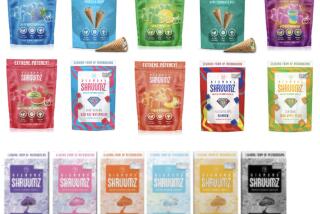FDA studies caffeine’s effects on children, teens
- Share via
WASHINGTON — The presence of caffeine in gum, jelly beans, waffles and other foods has prompted the Food and Drug Administration to investigate the stimulant’s potential effects on children and adolescents.
The FDA’s announcement comes a few weeks after gum maker Wrigley introduced its Alert Energy Caffeine Gum. Each piece of the gum contains about as much caffeine as a half-cup of coffee, according to a consumer update that the FDA posted on its website Friday.
The update provided more information on an investigation the FDA announced earlier this week.
“The gum is just one more unfortunate example of the trend to add caffeine to food,” Michael R. Taylor, the FDA’s deputy commissioner for foods and veterinary medicine, said on the site.
Other caffeine-containing foods include waffles and maple syrup from Wired Waffles and Jelly Belly’s Extreme Sport Beans and Morning Spark Oatmeal from Energy Fiend.
Taylor said the FDA also was concerned about the marketing of highly caffeinated energy drinks to young people.
The agency does not have any rules for caffeine in food, but regulates alcoholic beverages that contain caffeine. The only time the agency explicitly approved caffeine in a product was for colas in the 1950s.
The investigation could lead to new regulations.
“If necessary, and if the science indicates that it is warranted, we are prepared to go through the regulatory process to establish clear boundaries and conditions on caffeine use,” Taylor said. “We are also prepared to consider enforcement action against individual products as appropriate.”
Wrigley, a unit of Mars Inc., acknowledged that its caffeinated gum exceeds product labeling requirements. The package identifies the caffeine content of the gum, and it is sold with other energy products. The company is marketing the gum to adults 25 and older.
“As the FDA refines its approach to caffeine, we welcome the opportunity to work with them on this important topic,” Wrigley spokeswoman Jennifer Jackson-Luth said.
Most adults can safely consume about 400 milligrams of caffeine per day, which is the amount contained in four or five cups of coffee, according to the FDA. But the agency has not set a safe level for children.
The American Academy of Pediatrics discourages caffeine consumption for young people.
The stimulant increases heart rate and blood pressure, and could negatively affect a child’s developing neurological and cardiovascular systems, a 2011 academy report stated. The report also noted that children ages 6 to 10 consume caffeine eight out of 10 days on average.
The study indicated that soda was the most common form of caffeine intake for children and that preventing them from drinking the sugary beverage is difficult.
“Avoidance of caffeine in young people poses a great societal challenge because of the widespread availability of caffeine-containing substances and a lack of awareness about potential risks,” the study said.
More to Read
Inside the business of entertainment
The Wide Shot brings you news, analysis and insights on everything from streaming wars to production — and what it all means for the future.
You may occasionally receive promotional content from the Los Angeles Times.










